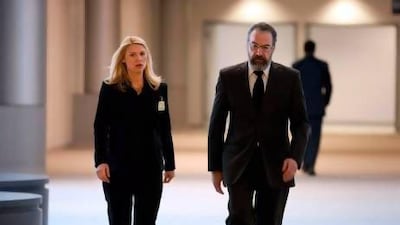Previously, on Homeland: an incredibly satisfying first season in which the rules of prime time US action drama appeared not to apply.
Given that there was a radical Islamic terrorist plot for the CIA to break apart, it seemed remarkable that the person charged with carrying it out was US Marine Sergeant Nicholas Brody, appalled by what he witnessed after a US drone strike in Iraq. The audience was invited to empathise with his situation as he found a crutch in Islam, even if Brody's attempts at prayers in his garage were laughably pronounced.
This was genuinely thoughtful stuff, particularly when a key character in the terrorist plot was another white American, Aileen Morgan. There was nuance - at long last a recognition, it seemed, of the complexities of modern-day terrorism and the agendas of the people who fight it. Homeland wasn't telling its broadly western audience that it was wholly "us versus them", "them" being the usual roll call of dastardly Arab characters so brilliantly described in Jack Shaheen's book and documentary Reel Bad Arabs as either "bombers, belly dancers or billionaires".
Then, in the second series, which began on OSN last week, the hard work is undone. I have watched the entire season, and it would be spoiling matters to reveal too much. But the heart sinks when the CIA officer Carrie, a character whom Claire Danes has previously imbued with encouraging understanding concerning the Arab world, begins chasing a suspect for no other reason than "he is a Muslim".
Granted, it's a line spoken in a moment of high stress for Carrie and she turns out to be misguided. But it seemed to sum up a series that has steadily simplified its portrayal of the Arab world, sparking debate about whether Homeland is Islamophobic.
Some of the criticism comes from the clear inaccuracies, such as Brody making a big play of burying his copy of the Quran because it has simply touched the floor and therefore been "desecrated". Setting last week's episode in Beirut but filming it in Tel Aviv was also problematic, and not just in terms of leaving Hebrew adverts in shot; every show has anachronisms like that. It was portraying the rather cosmopolitan Hamra Street as a seething hotbed of extremism, which exasperated the Lebanese government to the point where it threatened legal action.
"[It] damages the image of Lebanon - it is not fair to us and it's not true," said Fady Abboud, the minister of tourism, in Executive magazine.
But the slippage in Homeland's writing goes further than individual scenes into characterisation the Arab-American actor and comedian Maysoon Zayid.
"The parts Arabs get in American dramas are terrorist characters on the whole, and, despite what it promised, Homeland has done little to change that," she says. "It's the pinnacle of the negative Arab stereotype to the point where I find it almost unwatchable, although I do find it hilarious that the main character happens to be a white American. It's basically saying that we are nefarious and anyone who comes into contact with us will betray their people."
Many, of course, would argue that Homeland is merely a piece of entertainment based in a world that has witnessed instances of "Islamic" terrorism. There are also a smattering of roles that provide a more positive representation of Islam.
Damian Lewis, who plays Brody, told Radio Times last year that a provocative scene concerning Islam was cut, and the co-creator Alex Gansa has been at pains to point out that Brody's conversion should not be linked to terrorist ideals. So there is a semblance of sensitivity at play - indeed, it becomes clear that the people who are really, insidiously corrupt are those who would govern the United States. By that rationale, when it comes to the portrayal of the Arab world, Homeland is not inherently Islamophobic as much as plain sloppy.
But when the show asks its viewers to believe it is set in some kind of reality (there are mentions of Osama bin Laden, after all) it's surely not asking too much for there to be one major Muslim character who isn't hell-bent on destroying the US.
Perhaps that will have to wait until season three.

